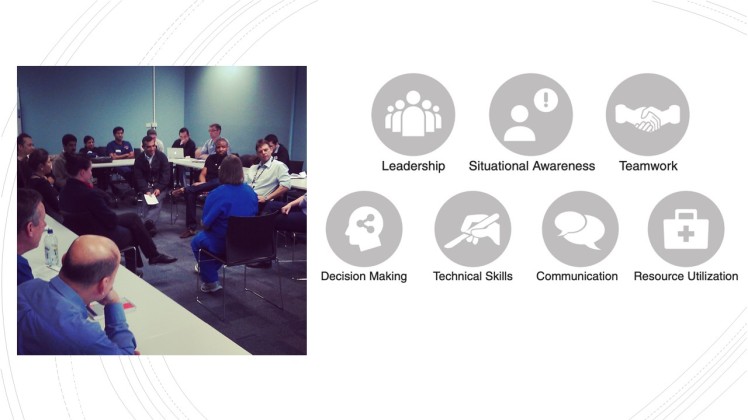Simulation Flashback
Our friend Dr Walter Eppich (@learnthrutalk) presented on his paper “Learner-Centered Debriefing for Health Care Simulation Education: Lessons for Faculty Development” at AMEE 2017.
In a brief epiphany, we flashed back to our notes on this topic today – realising how positively influential this paper and follow up work has become for the debriefing culture in our setting in 2024.

Professor Eppich stated (according to my handwritten scrawls) that there are tensions for Simulation educators (instructors) when providing simulation sessions in regards to the debriefing.
“Should we do what (we) the instructor wants to do, collectively set objectives or have a learner centered approach?” and “There is a lot to think about during a debriefing”
Assuming you are a medical teacher, simulation educator or interested learner – consider the following… During your next simulation session should you consider shifting to a more LEARNER CENTRED position?
As instructors we have responsibility and often expected to lead the setup, pre-brief, learning agenda and balance of power. Learner centred Teaching was promoted as preferable in this AMEE session. This balanced approach (where the instructor does not overly dominate) should allow our learners to deeply reflect and lead construction of new knowledge.
Challenges set out by the Speaker Prof Eppich
- How do you currently identify as a simulation educator – Walter suggested that a “guide on the side” might be a useful way to think about our identity
- Walter described the idea of “nurturing” active learners who are making meaning of the experience in their own team and individual contexts – dominating the debriefing could inhibit this process
- Are we adequately considering the learners in the session? (we often have fairly independent, self-directed learners in simulation)
- Should we remove pressure of instructor to know all the answers? (and set expectations in this regard)
- Should we expect mutual power sharing and active collaboration within the session?
Overview of Instructor Led Debriefing
- This may not work as well for experienced learners
- Requires learners to make meaning(s) for themselves based on instructors contribution
- Instructors adopt a “sage on stage” role
- Learners become dependent and instructor directed (this is too much pressure if you ask me)
- Instructors have relative unilateral power in some cultures

HOW IS THIS ALL APPLIED TO OUR DEBRIEFINGS?
Reactions Phase
- Identify the leaner experience and assist where required with constructing an agenda
- Manage the balance between leaner and instructor depending on your judgement
Analysis Phase
- Prioritise content for discussion (fits with UK model that includes AGENDA SETTING)
- Promote leaner self assessment
- Manage timing and transitions
- Close performance gaps if rationale is clear
- Check understanding and close each area before moving on, i.e., “What are your questions on airway management before we move on?”
Summary Phase
- Assist where required in the identification of key take homes
References
Duff JP, Morse KJ, Seelandt J, Gross IT, Lydston M, Sargeant J, Dieckmann P, Allen JA, Rudolph JW, Kolbe M. Debriefing Methods for Simulation in Healthcare: A Systematic Review. Simul Healthc. 2024 Jan 1;19(1S):S112-S121.
Boet S, Bould MD, Sharma B, Revees S, Naik VN, Triby E, Grantcharov T. Within-team debriefing versus instructor-led debriefing for simulation-based education: a randomized controlled trial. Ann Surg. 2013 Jul;258(1):53-8.
Sargeant J, Lockyer J, Mann K, Holmboe E, Silver I, Armson H, Driessen E, MacLeod T, Yen W, Ross K, Power M. Facilitated Reflective Performance Feedback: Developing an Evidence- and Theory-Based Model That Builds Relationship, Explores Reactions and Content, and Coaches for Performance Change (R2C2). Acad Med. 2015 Dec;90(12):1698-706.
